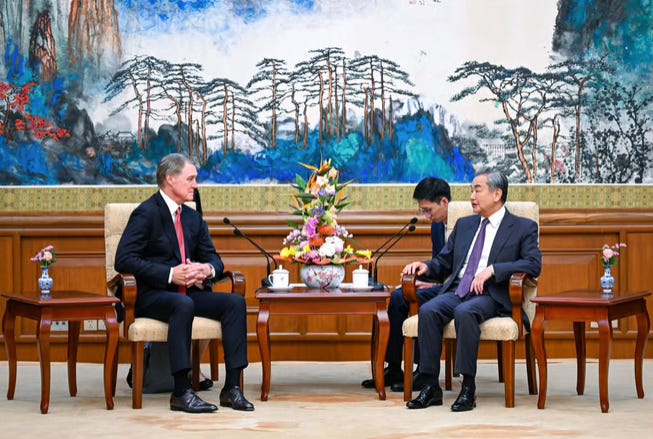Trump Blasts Xi as ‘Extremely Hard to Make a Deal With’
US president fumes as Beijing’s non-tariff export curbs pressure US carmakers, Xi stalls phone call.
US President Donald Trump lashed out at Chinese President Xi Jinping in an early morning social media post on 4 June, calling Xi hard to work with.
The message, posted on Trump’s Truth Social platform around 2:17 am ET, raises doubt a phone call between the two leaders will happen this week.
The post followed a high-level meeting in Beijing on Tuesday between Chinese Foreign Minister Wang Yi and new US Ambassador David Perdue.
Wang emphasized that the bilateral relationship was at a ‘crucial juncture.’ He urged Washington to ‘meet China halfway’ and create ‘necessary conditions’ to stabilize ties.
‘Equality and respect are the prerequisites for interactions, while dialogue and cooperation remain the only correct path forward,’ Wang said.

White House Press Secretary Karoline Leavitt told reporters that a call was ‘likely’ to happen this week but did not confirm a date. ‘There will be a leader-to-leader talk very soon, and when that happens, as always, we will let you know,’ Leavitt said.
Asked Tuesday about the status of a Xi-Trump phone call, Chinese Foreign Ministry spokesperson Lin Jian offered no confirmation: ‘I have no information to share on that.’ Trump and Xi have not spoken since shortly before Trump began his second term on January 20.
Magnet exports
A key issue for the US is growing supply chain disruptions linked to China’s export controls on rare-earth magnets, a critical component in electric vehicle motors. Major automakers are now weighing emergency workarounds, according to a report in the Wall Street Journal, including shifting some manufacturing to China to circumvent the restrictions.
Industry insiders say some manufacturers are considering assembling electric motors in the US and shipping them to China for final magnet installation, as Beijing’s export curbs apply to raw and semi-processed magnets, not finished products.
If executed, such moves would mark a stunning reversal for Trump’s ‘America First’ trade policy which aims to repatriate manufacturing from China.
That would be an ironic outcome of the trade war, if companies are essentially being forced back into China to keep their production lines moving.
Automakers in Japan, India, and across Europe are also reporting delays and risks to their operations, highlighting the global scope of China’s dominance in rare-earth materials.
Beijing would like to see a rollback of punitive tariffs imposed by Trump going back to his first term. Chinese officials have indicated that returning tariffs to pre-2018 levels around 4 percent could pave the way for a major agreement. This would require Trump to backtrack on his ‘America First’ tariff policy which seems unlikely.
Meanwhile, both sides are facing mounting economic pressures and political risks.
Trump: Putin Plans Response to Drone Attack
Trump and Russia President Vladimir Putin held a one-hour phone call on 4 June as hopes for a cease-fire dimmed following Ukraine’s surprise attack on Russia’s strategic nuclear bombers.
‘President Putin did say, and very strongly, that he will have to respond to the recent attack on the airfields,’ Trump said on social media.
Trump described his call with the Russian leader as a ‘good conversation, but not a conversation that will lead to immediate Peace.’
Tiananmen Square anniversary
The 36th anniversary of China’s military assault on pro-democracy protests on 4 June 1989, passed quietly in Beijing, according to The Associated Press.
‘Security was tight Wednesday around Beijing’s Tiananmen Square, where weeks of student-led protests shook the party in 1989. Under then-leader Deng Xiaoping, the military was sent in to end the protest on the night of June 3-4. Using live ammunition, soldiers forced their way through crowds that tried to block them from reaching the square. Thousands of people were killed, including dozens of soldiers.’
‘The party has tried, with some success, to erase what it calls the ‘political turmoil’ of 1989 from the collective memory. It bans any public commemoration or mentions of the June 4 crackdown, scrubbing references from the internet.’
‘In recent years, that ban has been extended to Hong Kong, where a once-massive annual candlelight vigil is no longer permitted.’






